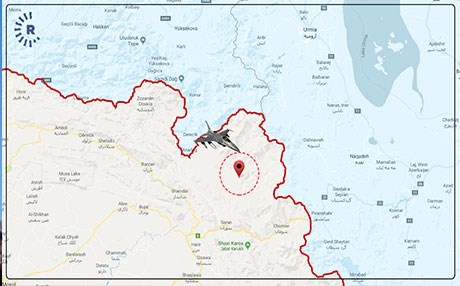
An undated image captures a Turkish military helicopter over the Hakurk (Khakurk) area in the Kurdistan Region of Iraq. File photo: AA
ERBIL, Kurdistan Region — Turkey has begun its second wave of Operation Claw against Kurdistan Workers’ Party (PKK) guerillas in the Khakurk area south of Turkey’s border with the Kurdistan Region of Iraq. The first phase commenced in late-May.
“On the evening of July 12, a new operation named Claw 2 was launched with our Commando Brigades in the north of Iraq to destroy caves and shelters used by a terror organisation. This is a follow-up on the successfully ongoing Claw 1 operation in the Hakurk [Khakurk] area which revealed new information on terrorist activity,” read a statement from the Turkish Ministry of Defense that was released on Saturday.
Ankara is branding the new offensive ‘Operation Claw 2.’ Hakurk is in the Kurdistan Region of Iraq, close to the borders with Turkey and Iran. It is located just north of Qandil, where the PKK is headquartered about 52 kilometers northeast of the regional capital city of Erbil.
The Hakurk region in Erbil Province, Kurdistan Region, Iraq. Graphic: Rudaw/Google Maps
“The operation continues as planned,” it added, detailing Turkey is supporting it with Air Force planes, ground fire support vehicles, TAI/AgustaWestland (ATAK) attack helicopters and unmanned aerial vehicles (UAVs).
The ministry has claimed it “neutralized” dozens of PKK fighters in the framework of Operation Claw, but the Kurdish group has refuted the figure.
Ankara uses the word neutralized to refer to those killed, wounded, or otherwise removed from the battlefield. The PKK has also claimed the lives of a number of Turkish soldiers. The two figures rarely match.
Both sides have been locked in a four decade-long, often armed conflict, resulting in the death of roughly 40,000 people, including civilians.
They reached a ceasefire deal in 2013 which lasted for more than two years, but deadly fighting soon resumed in the Kurdish provinces in southeastern and eastern Turkey.
Some 4,472 people have been killed since the peace process fell apart on July 20, 2015, according to the most recent figures from the International Crisis Group (ICG).
On the 38th anniversary of the July 14 event in a Diyarbakir prison, the PKK announced “Halat Retaliation Year” on Saturday. It is a reference to the killing of senior PKK leader Diyar Ghareen, known as Halmat by his comrades, during Turkish operations on July 5.
A group of Kurds were held in Diyarbakir prison after a 1980 military coup in Turkey. Abused in the jail, a group of the prisoners went on a hunger strike. The incident is commemorated by sympathizers remembered every year. A film about it called ‘14 Temmuz’ (July 14) has sometimes been banned by the Turkish state.
Firat News Agency (ANF), media affiliated with the PKK, published footage on Friday, purportedly showing Turkish military bases and convoys being attacked by guerillas in different areas on the Turkish side of the border with the Kurdistan Region.
The attacks took place on June 21 in Hakkari, on June 29 in Avasin, and on July 5 in Uludere, killing six soldiers, according to ANF.
The People's Defence Forces (HPG), the armed wing of the PKK, released photographs of two of its fighters who it claimed were killed in clashes with the Turkish Army inside Turkey in mid-May. The HPG typically announces their deaths weeks or months later.
The Kurdistan Regional Government and Iraqi federal government repeatedly have called on armed groups not to launch attacks against neighboring countries from within the country.
Kurdish groups opposed to the Iranian regime have also come under retaliatory attacks in recent days by Iran’s Islamic Revolutionary Guard Corps (IRGC) in areas just south of Hakurk and Qandil in recent days.









Comments
Rudaw moderates all comments submitted on our website. We welcome comments which are relevant to the article and encourage further discussion about the issues that matter to you. We also welcome constructive criticism about Rudaw.
To be approved for publication, however, your comments must meet our community guidelines.
We will not tolerate the following: profanity, threats, personal attacks, vulgarity, abuse (such as sexism, racism, homophobia or xenophobia), or commercial or personal promotion.
Comments that do not meet our guidelines will be rejected. Comments are not edited – they are either approved or rejected.
Post a comment